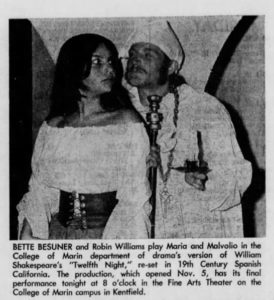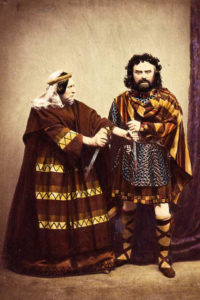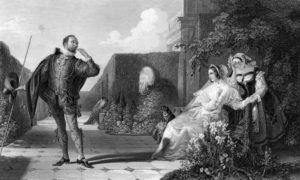
Finally, finally, my oldest gets to participate in a dedicated Shakespeare course this fall. I don’t have the title in front of me but it’s basically Shakespeare and Modern Film. Given that my bestest online Shakespeare pal is a dude whose actual name is “Bard Film” I can’t wait until she gets homework. (“Daddy, can I please do my own homework for once?” “It’s ok sweetie, Bardfilm and I have got this.”)
Anyway, we had to order textbooks and I see they’ll be studying Othello, Taming of the Shrew and Twelfth Night. Folger editions, for the curious.
Hmmm. Anybody else seeing a pattern there?
I’m calling it right now – I’m going to have my daughter watch O, 10 Things I Hate About You and She’s The Man before school starts because I’ll bet you anything that’s what they’ll be doing in class. I never thought I’d say this but I’m glad Hamlet’s not among her required texts. If they had her watching Lion King I don’t think I could stand it.

 This image is from 1971. I only wish I could have found the complete review! I did get a pointer to it, but it was behind a subscription paywall so I gave up on that idea.
This image is from 1971. I only wish I could have found the complete review! I did get a pointer to it, but it was behind a subscription paywall so I gave up on that idea. I love it when Shakespeare comes up at lunch. We were talking about with a coworker who’d been in Midsummer, and I asked whether his production had been on the light and glitzy side, or touched on some of the darker bits. This might be the play that kindergarten kids get to dress up as fairies, but it’s also the play where a husband drugs his wife and sends her off to be with an animal until he gets everything he wants.
I love it when Shakespeare comes up at lunch. We were talking about with a coworker who’d been in Midsummer, and I asked whether his production had been on the light and glitzy side, or touched on some of the darker bits. This might be the play that kindergarten kids get to dress up as fairies, but it’s also the play where a husband drugs his wife and sends her off to be with an animal until he gets everything he wants. Over the centuries it’s been common practice to spin a happy ending on Shakespeare’s tragedies. Romeo and Juliet live, King Lear and Cordelia live happily ever after.
Over the centuries it’s been common practice to spin a happy ending on Shakespeare’s tragedies. Romeo and Juliet live, King Lear and Cordelia live happily ever after.